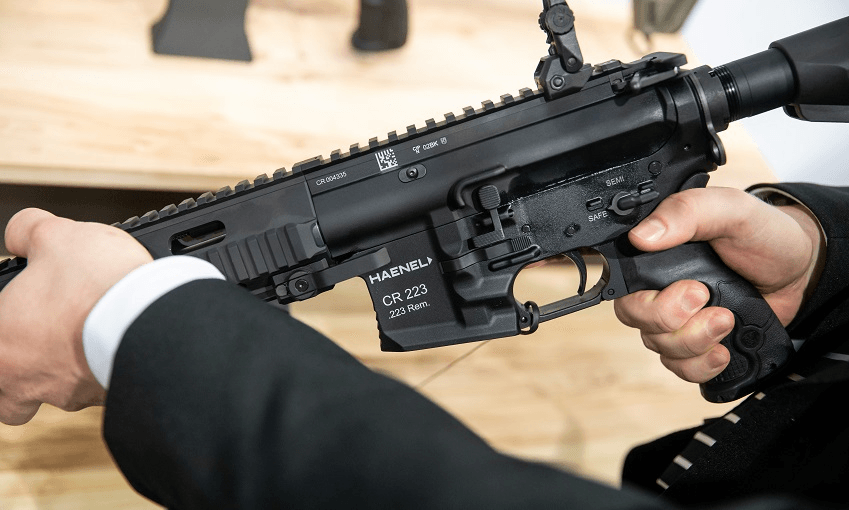As New Zealand grapples with the aftermath of the Christchurch mosque shooting anger is growing over the ‘gaps, omissions and errors’ in our gun laws.
In a day of extraordinary contrasts on Monday, the prime minister this afternoon said gun law reform would urgently pursued, while the man who sold weapons to the man charged with the Christchurch murders denied any responsibility and refused to discuss the issue of gun control.
In her post-cabinet press conference, Jacinda Ardern said Cabinet has made a unanimous decision to introduce changes to firerarms legislation, with details to be revealed within 10 days. She will not confirm whether this will include a ban on semi-automatic weapons.
It was imperative to act immediately following the Christchurch shooting, she said. “It exposed a range of weaknesses in New Zealand gun laws and to make our community safer the time to act is now.”
She issued a message, too, to anyone who had weapons “they either should not be in possession of or have concerns over” following the attack, which took 50 lives. Such owners “are welcome at any time to surrender that weapon to police”, she said.
Anti-gun feeling has grown as public horror over the tragedy converts to anger. Trade Me has halted the sale of semi-automatic weapons, while the Kumeu Militaria Show due to be held this Saturday was cancelled out of “respect for the victims of the Christchurch terror attacks and because [of] the elevated security risks”, organisers said.
Two petitions have been launched calling for semi-automatic weapons to be banned – here and here – with both getting close to their target number of signatures within a day.
Some Kiwis have preempted the prime minister and expressed their disgust by handing their guns to police.
https://twitter.com/SirWB/status/1107405903546863616
In a bizarre, sometimes confrontational press conference earlier in the afternoon, the owner of the Gun City retail chain David Tipple said he did not feel “any sense of responsibility” for selling weapons to the alleged shooter.
The shooter had purchased four “A category” weapons and ammunition from Gun City by mail order, he said. These are items that can be bought with an ordinary firearms licence.
Tipple insisted that Gun City had not sold the alleged shooter a military-style semi-automatic (MSSA) rifle such as the one apparently used in the attacks.
“We didn’t sell him a rifle used in the incident,” he says. “I watched the video, I saw the rifle … and it was not from any Gun City affiliated store.
“I believe it was fitted with a magazine that would not have been sold with it.”
Tipple said Gun City monitors the number and types of firearms and accessories people buy to “prevent something that could result in an army build up”. The sales to the shooter did not raise any red flags. “He was a brand new purchaser with a brand new licence, it was an ordinary sale.”
A belligerent Tipple refused to take questions related to gun control and threatened to walk out if reporters persisted.
“We are not a country of emotional responses, we are a country of laws,” he said. “What we are doing is legal and the majority of people have put in place the government that set those laws.”
Tipple defended the fact that one of his Gun City outlets remained open and selling weapons just a few kilometres from the mosques where the shootings occurred.
“This man wrote in his manifesto that the purpose of using a firearm was to divide us. If we allow him to make changes in our ideology in our behaviour he’s won,” he said.
Tipple expressed sympathies to the affected families and said Gun City is co-operating fully with police and the government.
Tipple is the same gun store owner who led a challenge against a police clampdown on the importation of parts for AR-15 semi-automatic rifles. The shooter is believed to have used a modified AR-15 in the Christchurch attacks.
It is legal for anyone with a standard ‘A category’ firearms licence to buy a AR-15, because under New Zealand law it’s not considered an MSSA. These so-called ‘sporterised’ semi-automatics can then be easily converted into an MSSA by adding an also perfectly legal high-capacity magazine.
The police warned incoming police minister Stuart Nash in December 2017 about this and myriad other problems with New Zealand’s gun laws. The 1992 law has not kept pace with changes in gun manufacturing such as the interchangeability of ‘A category’ semi-automatics and MSSAs, they said in a briefing paper.
Frontline police are seeing more high-risk firearms such as pistols, semi-automatics, MSSAs and ex-defence weapons, and “gaps, omissions, errors and unclear drafting” in the law are undermining their ability to manage the threat, the paper said.
Some dealers get around the law by importing parts that are interchangeable between MSSAs and ‘A category’ rifles. “This enables domestic assembly and the assembler to later purchase parts such as a large-capacity magazine or pistol grip without a licence, and to turn the assembled ‘A category’ semi-automatic into a MSSA,” the police told the minister.
New Zealand Defence Force veteran and gun control lobbyist Josh Jacobsen has launched a petition calling for all assault rifles to be banned. “These are things thing that are used by soldiers and law enforcement personnel, and there is really no reason for these weapons to be in the hands of the general public,” he says.
He points to the Australian ban on the firearms following the 1996 Port Arthur massacre. “We have a template, essentially, to look at. The Australians did a very good job, the gun deaths in Australia declined after that.”
His petition also calls for registration of all firearms, something that was abandoned in 1983 because the system was ineffective. “Technology has come a long way since 1983, we have the ability to track and process vast amounts of data,” Jacobsen says.
But gun blogger Mike Loder says to ban semi-automatics would be to impose a solution without identifying the problem.
The Christchurch mosque attacker had several different types of guns, and “the idea that if you take away the semi-auto the situation’s safe, it’s ridiculous.
“You can’t legislate against savagery.”
Banning semi-automatic weapons would only push them underground, he argues. He wants to see more thorough enforcement of existing laws. The crackdown on the importation of AR-15 parts is the latest in a long line of inconsistent application of the Arms Act, he argues.
“You have to understand there’s law, and then there’s police policy and it’s a spinning wheel of chance. If you call up three different arms officers you’ll get three different answers,” Loder says.





